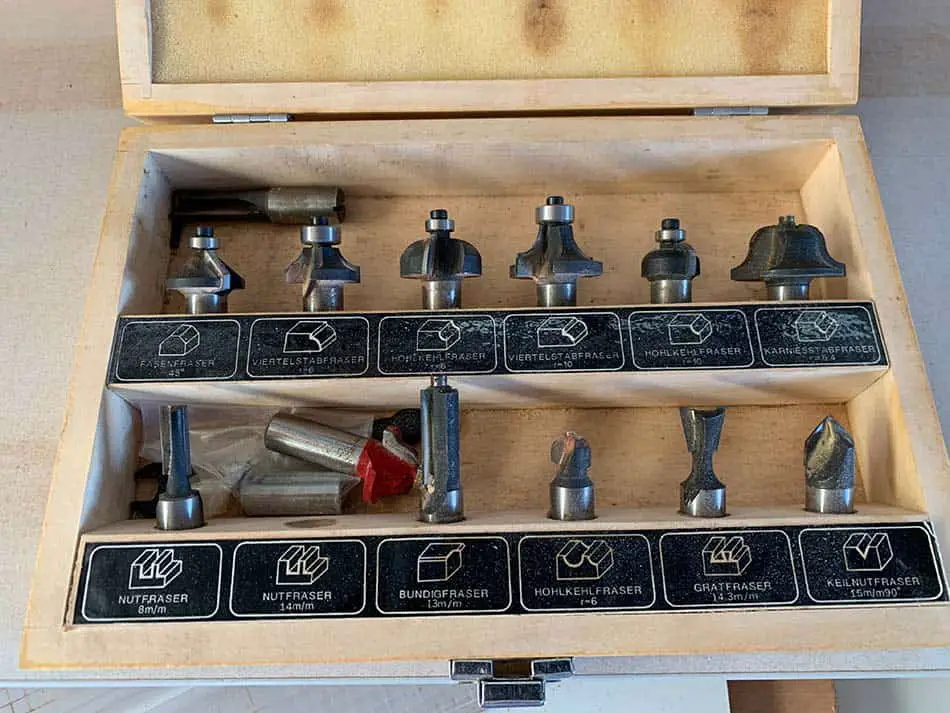If you are a woodworker, you know that a router is an essential tool in your workshop. Router bits are also important tools to have, and you might ask yourself, are router bits universal? I recently did this with my projects and research, and here is what I found out.
In general, router bits are not universal, but do come in 2 standard sizes. The standard router bit shank sizes are 1/4 inch and 1/2 inch. Smaller routers will accept the 1/4 inch while larger routers will accept the 1/2 inch.
In this blog post, I will discuss whether or not router bits are universal and which routers they will fit. I will also provide tips on choosing the right router bits for your needs.
Here are the router bits I use and highly recommend you take a look at them. I use Amazon and they have free postage. These will give you the best results and will fit in most routers:
- 1/4 inch router bits click here
- 1/2 inch router bits are found here
- 1/4 collet is a must for converting 1/4 shank to fit 1/2 routers. Get them here
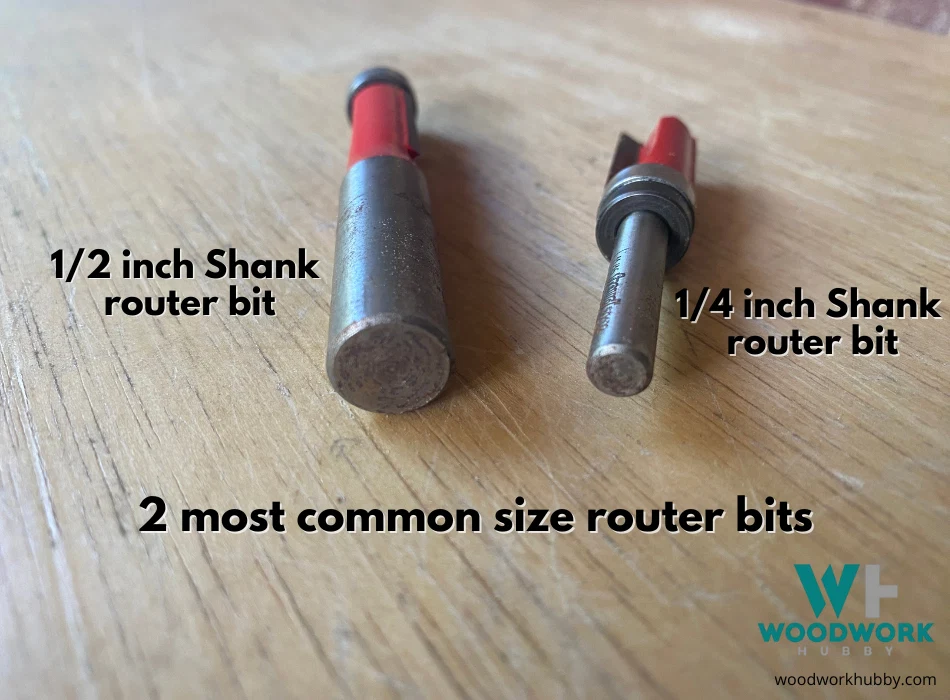
Will Any Router Bit Fit Any Router?
Router bits are not universal, but are designed to fit most routers. The size of the router bit will dictate which routers it will fit. 1/4-inch bits are the most common universal bits; they can fit in small routers. 1/2-inch bits are designed to fit into larger routers.
The type of router also matters. A plunge router will have a different collet size than a trim router. A fixed-base router uses a 1/2-inch collet, while a plunge router uses a 1/4-inch or 8mm collet. If you are using a trim router, you will need bits that are 1/4-inch or smaller.
Some specialty routers use their proprietary bits. These bits will only fit the specific router model they were intended for.
Bosch MRF23EVS and Makita RT0701CX3 are two examples of routers that use proprietary bits.
Are All Router Bits the Same?
All router bits are not the same. Router bits come in various sizes and shapes to accommodate different routing tasks. The most common router bit types are:
Straight Router Bits
Straight router bits are the most versatile and can be used for various tasks, such as rabbeting, dadoing, and grooving. They are available in a range of sizes from 1/4-inch to 1-inch in diameter.
They cut into a material to create a dado that hollows out an area for another piece of material to fit into. This is useful for creating drawer joints and shelf supports.
See my article on how long do router bits last?
Edge Forming Bits
Edge-forming bits are used to create profiles on the edge of a workpiece. They can be used to round over edges, create chamfers, or make moldings. Edge-forming bits are available in a range of sizes and profiles.
Flush Trim Bits
These router bits work by trimming the edge of one material to fit flush with that of another. They are available in many sizes and can be used with a template or follow a bearing.
Chamfer Bits
Chamfer bits are used to create beveled edges on a material. They come in several angles, such as 45-degree and 60-degree, and can be found in various sizes.
Rabetting Router Bits
Rabetting bits are used to create a rabbet, or a groove, on the edge of a material. These router bits come in several sizes and can be found with or without bearings.
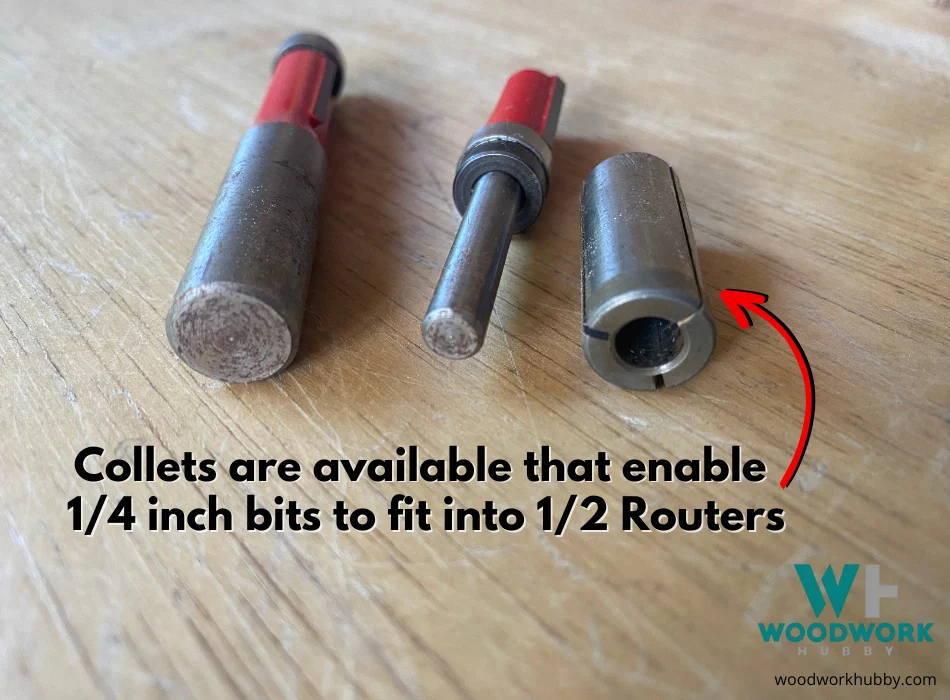
How Are Router Bits Measured? How To Know What Size It Is?
Router bits are sized by the shaft or shank if you are wanting to know which router they will fit. The most common router bit diameters are 1/4 inch, 3/8-inch, and 1/2 inch. Router bits can also be measured using the overall length, cutting diameter, angle of the cut, radius, and cutting edge length.
To determine the shank size of a router bit, take a pair of calipers and measure the diameter of its shank.
What Size Router Bits Are Considered Universal?
1/4-inch bits are considered the most universal; they can fit in small and larger routers. 1/2 inch comes a close second because it can also fit in most routers. 3/8-inch bits are too large for most small routers and won’t provide enough power for larger routers.
How Do I Choose the Right Size Router Bit?
The size of the router bit you need will depend on the material you are using and the depth of the cut you want to make.
Video showing which router bits to buy and which ones you should start with
For example, if you are working with a softwood like pine, you can use a smaller router bit. However, working with a hardwood like maple, you will need a larger bit.
Other factors to consider include the following:
Depth of the Cut
Most of the time, you will want to use the largest bit that will allow you to make the depth of cut you need.
For example, if you only need to remove 1/8 inch of material, a 1/4-inch router bit would be too large, and a 1/16-inch bit would be too small. In this case, you would want to use a 3/32-inch router bit.
Type of Cut
The type of cut you need will also affect the size of the router bit you use. For example, if you are making a plunge cut, you will need a smaller bit than if you are making a straight cut.
What is the Shank Size on a Router Bit?
The shank is the part of the router bit that fits into the router’s collet. The most common shank sizes are 1/4-inch and 1/2-inch.
Some bits have a reduced shank, which is smaller in diameter than the cutting end. These bits are typically used in small routers because they provide more power and control.
Router Shank Sizes and Which Routers They Fit
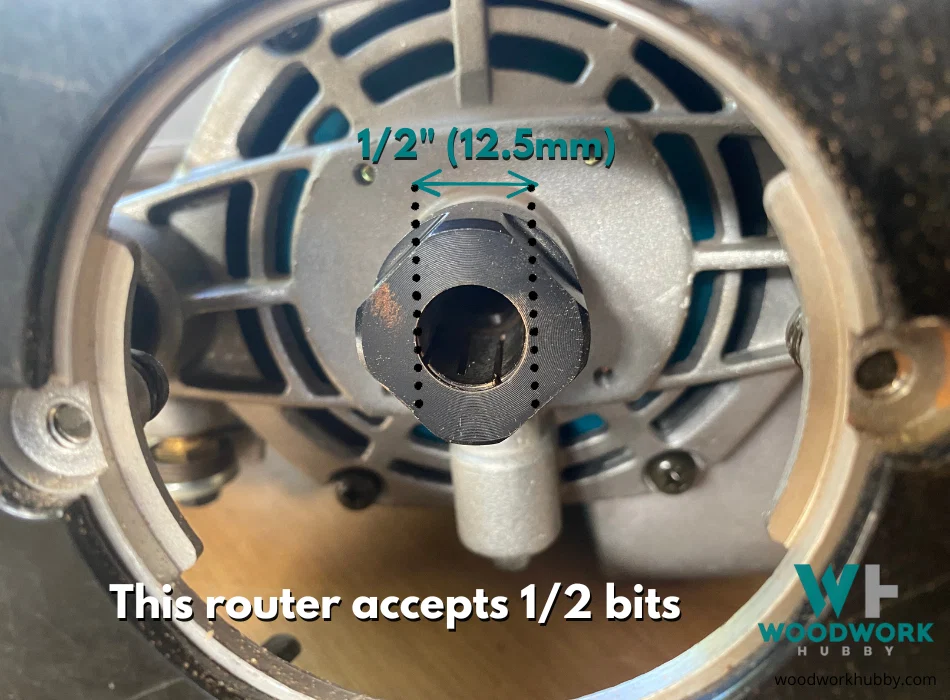
Router shanks come in two main sizes. The 1/4-inch shank and the 1/2-inch shank. Here is a detailed discussion on both sizes and which routers they fit.
The 1/4-inch Shank
Bits with a 1/4-inch shank are the most common and can be used in most routers. These bits are well-suited for small to medium-sized routers because they offer more control and precision.
The 1/2-inch Shank
The 1/2-inch shank is most commonly used in large routers because it offers more power. This size is not as common as the 1/4-inch shank and may not be compatible with all routers.
Are Ryobi Router Bits Universal?
Ryobi router bits are universal as they come in both 1/4 shank and 1/2 shanks which do fit any brand of router. These router bits are available in a range of sizes and profiles to suit your needs. You can find Ryobi router bits at most hardware stores or online retailers.
What Size Shank Does a Ryobi Router Take?
The size of the shank on a Ryobi router bit will depend on the model of router you have. Most Ryobi routers use a 1/4-inch shank, but some models may use a 1/2-inch shank. To determine the size of the shank on your Ryobi router bit, consult your router’s manual or the manufacturer’s website.
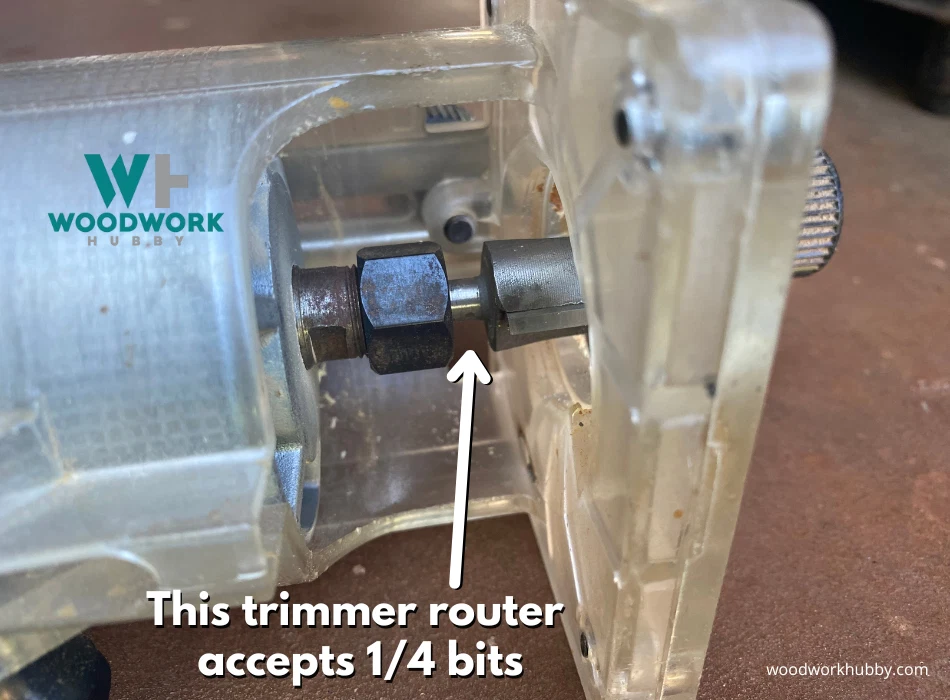
Do Router Bits Fit in a Drill?
Router bits will fit in most drill chucks as the larger router bits are 1/2 inch (12.5mm) and most drill chucks can accept up to 13mm drill bits.
To determine if a router bit will fit in your drill, measure the bit’s shank. If the shank is larger than the chuck on your drill, the bit will not fit.
Some router bits have a reduced shank, which is smaller in diameter than the cutting end. These bits can usually be fitted into a drill, but they may not provide enough power for some applications.
Can I Use a Router Bit in a Drill Press Or Drill?
You can use a router bit in a drill press provided it is a straight cutting bit although it is NOT recommended. A drill press should only be used for drill bits while router bits should be put into a router.
Video showing why you should not use a router in a drill
Do All Dewalt Routers Take the Same Bits?
Not all DeWalt routers use the same bits. The size of the shank on a DeWalt router bit will depend on the model of router you have. Most DeWalt routers use a 1/4-inch shank, but some models may use a 1/2-inch shank.
To determine the size of the shank on your DeWalt router bit, do the following:
Consult manual: The size of the shank will be listed in the router’s manual.
Check the manufacturer’s website: The shank size is usually listed on the product page for the router bit.
Can I Use a 1/4-Inch Router Bit in a 1/2-Inch Router?
You can use a 1/4-inch router bit in a 1/2-inch router, provided you are using a collet adaptor. 1/4 router bits are not designed for heavier work but can be used with care.
Can I Use a Drill Bit in a Router?
You cannot use a drill bit in a router as a router collet is designed to take 2 sizes of router bits only. If you could find a drill bit that would fit, you could use it to plunge only!
There is really no point in trying and would be dangerous to try.
What is the Difference Between a Router Bit and a Drill Bit?
Router bits and drill bits are used to make material holes, but they are designed for different purposes. Router bits are designed to cut and make shapes on the edges of wood and plastic, while drill bits create holes in materials like wood, metal, plastics, and concrete.
Other differences include:
Shank Size
Router bits have a smaller shank than drill bits. The shank size is important in determining which type of bit can be used in which tool.
Cutting Edge
Router bits have a cutting edge that is sharpened to create clean, smooth cuts. Drill bits have a cutting edge that is designed to create holes, not cuts.
Flutes
Router bits have flutes, or spiral grooves, that remove chips and debris from the cut. Drill bits do not have flutes.
Speed
Router bits are designed to be used at slower speeds than drill bits. The speed of a router bit is determined by the material it is made from and the type of cut it is designed to create.
Material
Router bits are made from high-speed steel or carbide, while drill bits can be made from a variety of materials, including carbon steel, cobalt, and titanium.
Why Choose the Best Size Bit for Your Router
Here are some reasons why you should use the best size bit for your router:
Avoid Overheating
A small router bit will not be able to handle the power of a large router. This can cause the bit to overheat and break. It can also lead to poor results as the bit will not be able to make clean, precise cuts.
Get the Best Results
Using the best size bit for your router will ensure that you get the best results. The bit will be able to handle the power of the router and create clean, precise cuts.
Ensure Safety
Operating a router with a bit that is too small can be dangerous. Always use the proper size bit for your router to avoid injury. With the wrong-sized bit, the router can kick back, which can lead to serious injury.
Can I Use a Router Bit on Metal?
Router bits are not designed for use on metal. The cutting edge of a router bit is not sharp enough to cut through metal, and the speed at which router bits operate is too slow to cut metal safely.
Attempting to use a router bit on metal can damage the router bit and pose a safety hazard. If you need to cut metal, use a drill bit or saw blade designed for that purpose.
Final Thoughts – Are Router Bits Universal?
Router bits are not considered universal, and the size of the shank will determine which router the bit can be used with. The best size bit for your router will depend on the power of the router and the type of cuts you need to make.
Always use the proper size bit for your router, and never use a router bit on metal. Doing so could damage the router bit and pose a safety hazard. I hope this article has helped you understand more about router bits and how to choose the best size bit for your router.

